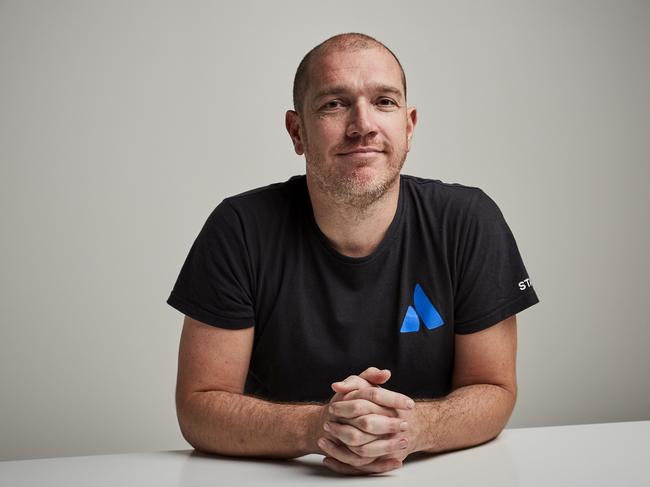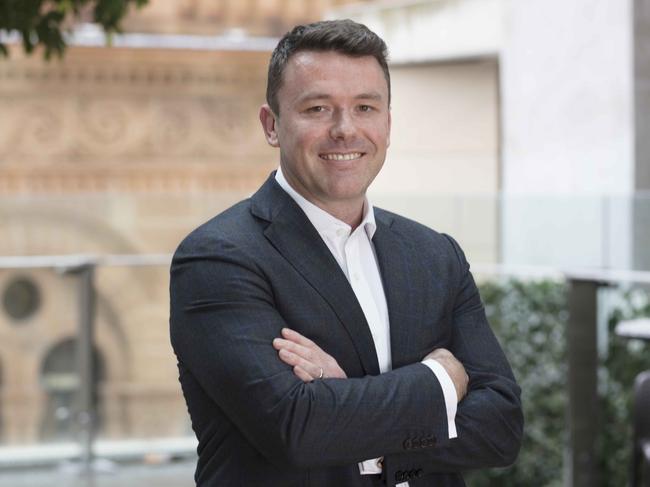The Great Resignation: experts divided over whether it is coming to Australia
Believers and sceptics say why they think the global trend of employees quitting en masse will come here – or not.
SmartDaily
Don't miss out on the headlines from SmartDaily. Followed categories will be added to My News.
Talk of The Great Resignation has been ramping up in Australia, as employers worry their staff will begin changing jobs en masse, mirroring global trends.
In the US, voluntary resignations rose to their highest level on record in September, with three per cent of the workforce leaving their job that month, according to the US Bureau of Labor Statistics.
Similar trends have been seen in Europe and the UK, but experts are torn over whether TGR will come to Australia.
THE BELIEVERS
Exclusive research from human resources company Ceridian reveals two-thirds of Australian workers are a flight risk.
Its annual Pulse of Talent report, surveying 1000 people in September and October, shows 30 per cent are actively seeking a new job and 36 per cent would move for the right opportunity.

Ceridian managing director APJ Stephen Moore says there is “certainly a marked shift in the employment market” and although it’s too early to tell if it’s permanent, “the signs look ominous”.
“Workers have been under tremendous pressure throughout the pandemic with the nature of work changing almost instantly, demanding increased personal and professional responsibilities,” he says.
“Not only are workers tired, but they’re much more likely to consider new opportunities – many of which are ‘virtual first’.”
PwC’s What Workers Want report, which surveyed 1800 Australians in September, also shows workers have itchy feet.
Almost two in five (38 per cent) planned to leave their employer within 12 months.
By comparison, PwC Australia future of work lead Dr Ben Hamer says staff turnover before the pandemic was about 11 per cent.
“While intention to leave is not an actual, it is still significantly higher than pre-pandemic turnover,” he says. “We are in the middle of a significant war for talent.”

Demographer Bernard Salt believes TGR is “a terrific theory” that will have a “real and significant” effect in the next six to 12 months.
“(We’ve had almost) two years to consider the bigger picture,” says Salt, speaking recently at ServiceNow’s Leaders Lounge 2.0.
“Many people have become very reflective and they are considering: Are you in the right business? The right job? Does the company you work for deliver a product or service that aligns with your values, with your view of the next 10 years or so?”

Salt says a low unemployment rate has also shifted the power balance towards employees.
“(TGR) is very real, it’s right upon us,” he says.
Darren Winterford, CEO of SafetyCulture’s training arm EdApp, agrees TGR “absolutely is real” – but it is a positive for tech companies attracting the career changers.
“We are seeing a drift away from traditional-thinking industries and a drift towards empowered, mission-driven roles and companies looking to make a real impact,” he says.
Shannons Insurance is also preparing to take on career changers with 40 call centre roles set to open across Adelaide, Perth, Brisbane, Sydney and Melbourne.
No experience or qualifications are required, just a passion for cars or motorbikes.
Motor enthusiast underwriter Kerri Weir, 29, joined Shannons in September after leaving her career as a telecommunications technician.
“The circumstances of the pandemic were a definite motivator to change roles,” the Queenslander says.
“Stability and opportunity to grow and (future job) opportunities were also a deciding factor.”

THE SCEPTICS
Andrea Clarke, founder of digital learning business Future Fit Co, believes Australian businesses are “on the edge of an Employee Value Proposition emergency”, as companies scramble to attract and retain staff. However, she wonders if the desire to change jobs will simmer down after Christmas.
“No one has had a holiday for two years … I wonder how that data set is going to look in mid-February, when those who can take holidays have taken a real break,” Clarke says.

Atlassian work futurist Dom Price agrees the data is “less dramatic” than it seems.
He believes there may be an increase in job changes but not significantly so.
“The Great Resignation indicator is what people might want to do, and most people say, ‘Yes (I want a new job)’ because it’s a healthy thing to do,” he says.
“But is (there a job that is) going to be infinitely better or the environment better? You can have more impact-driving change where you are – where you have the knowledge IP and know people and are established.
“People think they are going to arrive at a new place and it will be magically better.”

Andrew Hanson, managing director of recruitment firm Robert Walters NSW, says that although rising wages are encouraging workers to look for new jobs, they are also causing employers to focus on retention strategies and new hires.
“Those opposing pressures may well dampen any likelihood of a mass exodus from Australian workplaces,” he says.
The firm’s September/October survey of 230 white-collar workers – mostly in accounting, finance and IT – shows the portion looking to change jobs (20 per cent) was about the same as a year earlier (24 per cent) and the year before that (21 per cent).
Those adamant they would stay with their employer, however, plummeted from about half of respondents to just 15 per cent.
Hanson says fears of TGR feel overblown, but it may be too early to tell.

Analysis of the marketing content and spend of major online job boards by digital marketing intelligence platform Pathmatics suggests the Great Resignation has not hit our shores.
Regional director Eugene du Plessis says there was an initial spike in ads post-lockdown but they have dropped a lot in recent weeks.
“(Most ads are) to do with the current working environment,” he says.
“If we were experiencing a mass exodus, you’d expect these platforms to focus more on finding candidates to fill roles for struggling companies.”

Originally published as The Great Resignation: experts divided over whether it is coming to Australia




